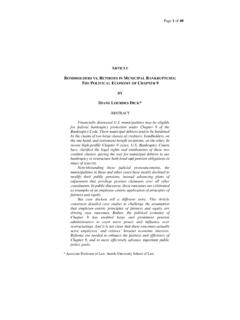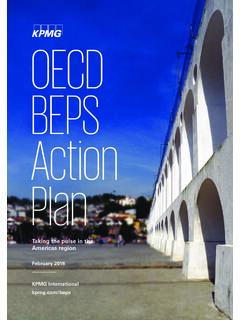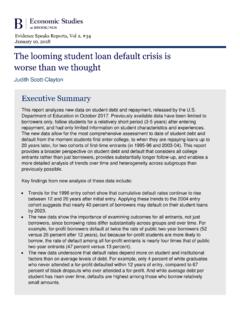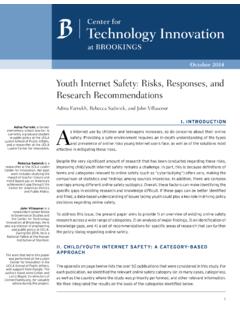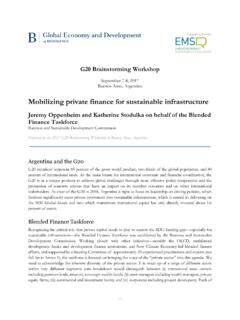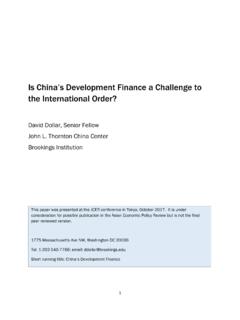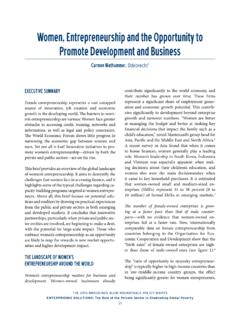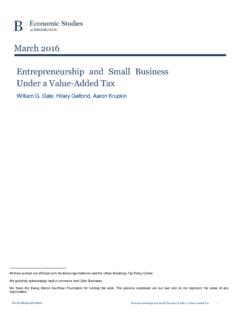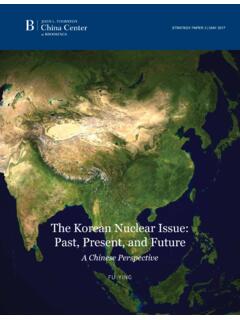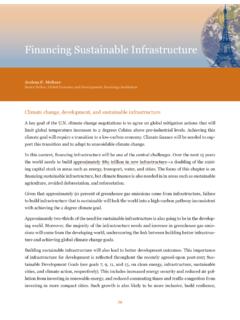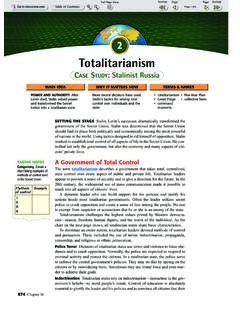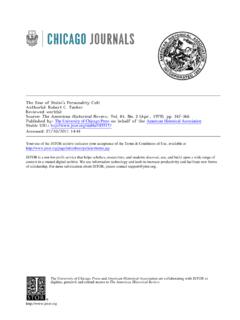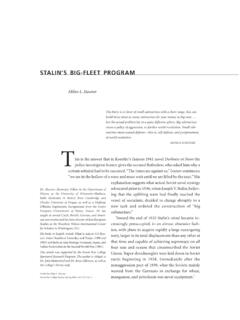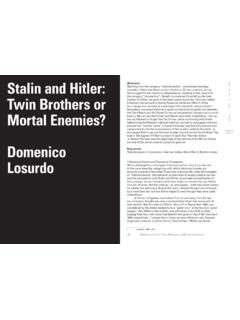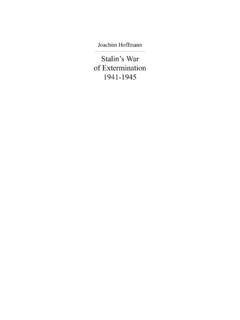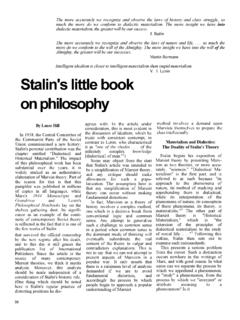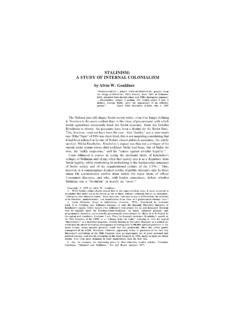Transcription of THE ARTS IN RUSSIA UNDER STALIN - Brookings Institution
1 The Sovietliterary scene is a peculiar one, and in order tounderstand it few analogies from the West are of use. For a vari-ety of causes RUSSIA has in historical times led a life to somedegree isolated from the rest of the world, and never formed agenuine part of the Western tradition; indeed her literature has atall times provided evidence of a peculiarly ambivalent attitudewith regard to the uneasy relationship between herself and theWest, taking the form now of a violent and unsatisfied longing toenter and become part of the main stream of European life, nowof a resentful ( Scythian ) contempt for Western values, not byany means confined to professing Slavophils; but most often ofan unresolved, self-conscious combination of these mutuallyopposed currents of feeling.
2 This mingled emotion of love and ofhate permeates the writing of virtually every well-known Russianauthor, sometimes rising to great vehemence in the protestagainst foreign influence which, in one form or another, coloursthe masterpieces of Griboedov, Pushkin, Gogol, Nekrasov,Dostoevsky, Herzen, Tolstoy, Chekhov, October Revolution insulated RUSSIA even more com-pletely, and her development became perforce still more self-regarding, self-conscious and incommensurable with that of itsneighbours. It is not my purpose to trace the situation histori-cally, but the present is particularly unintelligible without at leasta glance at previous events, and it would perhaps be convenient,and not too misleading, to divide its recent growth into threemain stages 1900 1928; 1928 1937; 1937to the present artifi-cial and over-simple though this can easily be shown to arts IN RUSSIA UNDER STALIND ecember194501_SOVMINDCH1.
3 12/19/03 11:23 AM Page 11900 1928 The first quarter of the present century was a time of storm andstress during which Russian literature, particularly poetry (aswell as the theatre and the ballet), principally (although one is notallowed to say so today) UNDER French and, to some degree,German influence, attained its greatest height since its classicalage of Pushkin, Lermontov and Gogol. Upon this the OctoberRevolution made a violent impact, but it did not dam the swellingtide. Absorbed and inexhaustible preoccupation with social andmoral questions is perhaps the most arresting single characteristicof Russian art and thought as a whole.
4 And this largely shaped thegreat Revolution, and after its triumph led to a long, fierce battlebetween, on one side, those primarily artistic rebels who lookedto the Revolution to realise their own most violent anti-bourgeois attitudes (and attitudinising) and, on the other, thoseprimarily political men of action who wished to bend all artisticand intellectual activity directly to the social and economic endsof the rigid censorship which shut out all but carefully selectedauthors and ideas, and the prohibition or discouragement ofmany non-political forms of art (particularly trivial genres suchas popular love, mystery and detective stories, as well as all vari-eties of novelettes and general trash)
5 , automatically focused theattention of the reading public on new and experimental work,filled, as often before in Russian literary history, with stronglyfelt and often quaint and fanciful social notions. Perhaps becauseconflicts in the more obviously dangerous waters of politics andeconomics might easily be thought too alarming, literary andartistic wars became (as they did in German countries a centuryearlier UNDER Metternich s police) the only genuine battlefield ofideas; even now the literary periodicals, tame as they necessarilyare, for this very reason make livelier reading than the monoto-nously conformist daily, and purely political, main engagement of the early and middle 1920s wasfought between the free and somewhat anarchist literary experi-menters and the Bolshevik zealots, with unsuccessful attempts atthe soviet mind201_SOVMINDCH1.
6 12/19/03 11:23 AM Page 2a truce by such figures as Lunacharsky and culmi-nated, by1927 8, first in the victory, and then, when it seemedto the authorities too revolutionary and even Trotskyist, in thecollapse and purge (during the 1930s), of the notorious RAPP(Revolutionary Association of Proletarian Writers), led by themost uncompromising fanatic of a strictly collectivist proletarianculture, the critic Averbakh. There followed, during the period of pacification and stabilisation organised by STALIN and his practi-cally-minded collaborators, a new orthodoxy, directed princi-pally against the emergence of any ideas likely to disturb and sodivert attention from the economic tasks ahead.
7 This led to a uni-versal dead level, to which the only surviving classical author ofthe great days, Maxim Gorky, finally and, according to some ofhis friends, with reluctant despair, gave his 1937 The new orthodoxy, which became finally established afterTrotsky s fall in 1928, put a firm end to the period of incubationduring which the best Soviet poets, novelists and dramatists, and,indeed, composers and film producers too, produced their mostoriginal and memorable works. It marked the end of the turbu-lent middle and late 1920s, when Western visitors were aston-ished and sometimes outraged by Vakhtangov s stage.
8 2whenEisenstein, not yet a film producer, directed his amusing futuris-tic experiments on stages discovered in the disused palaces ofMoscow merchants, and the great producer Meyerhold, whoseartistic life is a kind of microcosm of the artistic life of his coun-try, and whose genius is still only secretly acknowledged, con-ducted his most audacious and memorable theatrical arts in RUSSIA UNDER stalin31 The first two holders of the post of People s Commissar for [Culture and]Education (the translation of the Russian word prosveshchenie , whose mean-ing includes culture and education, is problematic): for their details seeGlossary.
9 2 Evgeny Bagrationovich Vakhtangov (1883 1923), actor, director anddrama teacher, pupil of Stanislavsky, was famous for his innovative work inthe Moscow arts Theatre in the 12/19/03 11:23 AM Page 3 There occurred, before 1928, a vast ferment in Soviet thought,which during those early years was genuinely animated by thespirit of revolt against, and challenge to, the arts of the West, con-ceived as the last desperate struggle of capitalism, presently to beoverthrown on the artistic as well as every other front by thestrong, young, materialist, earthbound, proletarian culture, proudof its brutal simplicity and its crude and violent new vision of theworld, which the Soviet Union, agonised but triumphant.
10 Wasbringing to herald and chief inspiring force of this new Jacobinismwas the poet Mayakovsky, who, with his disciples, formed thefamous LEF1association. While there may have been a great dealthat was pretentious, counterfeit, coarse, exhibitionist, childishand merely silly during this period, there was also much that wasbrimming with life. It was not, as a rule, didactically Communistso much as anti-liberal, and had in that respect points of resem-blance with pre-1914 Italian futurism. This was the period of thebest work of such poets as the popular tribune Mayakovsky,who, if he was not a great poet, was a radical literary innovatorand emancipator of prodigious energy, force and, above all, influ-ence; the age of Pasternak, Akhmatova (until her silence in 1923),Sel vinsky, Aseev, Bagritsky, Mandel shtam; of such novelists as Aleksey Tolstoy (who returned from Paris in the 1920s),Prishvin, Kataev, Zoshchenko, Pil nyak, Babel , Il f and Petrov.
